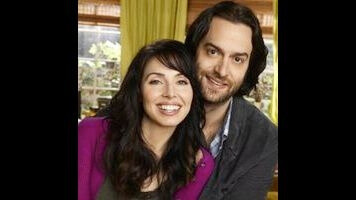Part of this has to do with Cummings being limited to a behind-the-scenes presence on 2 Broke Girls. In the première episode of Whitney, it’s clear that she’s still adjusting to the differences between performing stand-up comedy and acting on a sitcom. Even though she’s playing a fictionalized version of herself (the Whitney Cummings of Whitney is a professional photographer rather than a comic), Cummings’ delivery and screen presence are distractingly theatrical. It’s hard to fault her for this—even if she has a number of screen credits to her name, Cummings has spent years selling facial expressions and jokes to people sitting more than 10 feet away from her. Were it not for the presence of Chris D’Elia as Whitney’s boyfriend Alex, the scene in the pilot where the two prepare for a friend’s wedding (in the version NBC submitted to critics, at least) would just be Cummings working out new material in her bedroom. The demonstrative hand gestures, the looks of exasperation—all very stagey. D’Elia, who Steve assures me is a fantastic comic, is guilty of a lot of the same things.
The transitional nature of Cummings and D’Elia’s acting would be a lot easier to ignore if they were working with better material. It’s easy to forget now, but before every network wanted their own Friends clone to ride to Nielsens success, stand-ups ruled the sitcom landscape. Jerry Seinfeld, Bill Cosby, Roseanne Barr, Tim Allen—they all found success on TV by spinning off their considerably strong stand-up personas into considerably strong sitcom characters. Despite arriving in the wake of the first genuinely successful comedy club-to-TV translation in years—Louis C.K.’s cable oddity Louie—Whitney is definitely a throwback to the days of Seinfeld and Roseanne.
However, I’m not sure if Cummings’ perspective is well-defined or distinct enough to carry an entire multi-camera sitcom. And if it is, it doesn’t show in the pacing of the pilot, which ambles from setup (Whitney and Alex aren’t having enough sex) to punchline (Whitney’s sexy night of role-playing ends in injury) with little confidence. It’s a good thing Whitney is following The Office in the “comedown” half of NBC’s Thursday-night comedy bloc; compared to the electric buzz of Community and Parks And Recreation, Whitney seems positively sluggish.
The pilot puts up a Hail Mary with the sudden appearance of Jane Kaczmarek as Whitney’s thrice-divorced mother, but her entrance comes too late in the episode. Rather than a grand introduction, it feels like a desperate attempt to capitalize on fond recollections of Kaczmarek’s batty Malcolm In The Middle matriarch. But even in her minimal screen time, Kaczmarek is the brightest light in the show’s ensemble, which also includes Rhea Seehorn and Zoe Lister Jones as the friends alternately scaring Whitney into and out of committing to Alex for good. Jones, whose character is head-over-heels in love with Maulik “Shouldn’t have taken Alec Baldwin’s statements about 30 Rock’s impending end so seriously” Pancholy, could be the source of some zany fun down the line; Seehorn’s broad, wine-swilling performance would be the worst part of the pilot were it not for Daniel G. O’Brien’s Mark, a cop who’s never met a verb he couldn’t squeeze into a sexual metaphor.
Of course, those problems both go back to the way Seehorn and O’Brien’s characters are written: One-dimensional and schticky. But as we’ve said time and again in these pilot reviews: Television pilots are difficult prospects, and sitcom pilots are even moreso. Whitney shall not come to be judged by its initial 22 minutes alone; it will be the episodes that come after this which determine whether or not Cummings’ perspective on sex, long-term relationships, cohabitation, parents, and proper wedding attire are deemed funny enough to continue. (If we were judging on the pilot alone: Probably not.) And that’ll all depend how successfully and smoothly she can translate that point of view from her own words and into the words of other people. For some reason (Ambition? Chutzpah? The thought that only one of her pilots would make it to series?) she chose to take that task and double it, perhaps making Whitney half of the show it could’ve been.
Steve: Like Erik, I didn’t love the way Cummings’ stand-up shoehorned its way into the show. Unlike, say, Seinfeld (which is a pretty high bar, sure), Cummings’ stand-up doesn’t come out in the stories the pilot tells or how she tells them, just in disconnected one-liners about sex and wedding DJs. The show tries very hard to be witty just for the sake of being witty, and there’s very little about any character other than Whitney that feels special in any way. She’s thought greatly about herself, but again, only about what she says, not what she does.
The biggest casualty is Chris D’Elia. He’s a dynamic stand-up comic, utilizing physicality and a multitude of voices and energy levels. On Whitney, he’s been completely neutered. He’s playing the straight man to Whitney’s funny woman—the John Stockton to her Karl Malone—but delivers his lines sans any inflection or emotion. It’s one thing if that was just the way D’Elia was on stage (like, say, Todd Barry), but I’ve seen so much more from him.
He could have been a source of chaos, which leads me to my major complaint: There are no sources of chaos on Whitney. The story is too calculated, moving from scene-to-scene, moment-to-moment in a way the show projects from minute one. Whitney sees something in another relationship that her relationship is missing; she sets out to correct that. I suppose Whitney herself could be the source of chaos, but that would mean the rest of the world would have to turn against her—and right now, the show’s too focused on softening Whitney’s edges to play that out.
